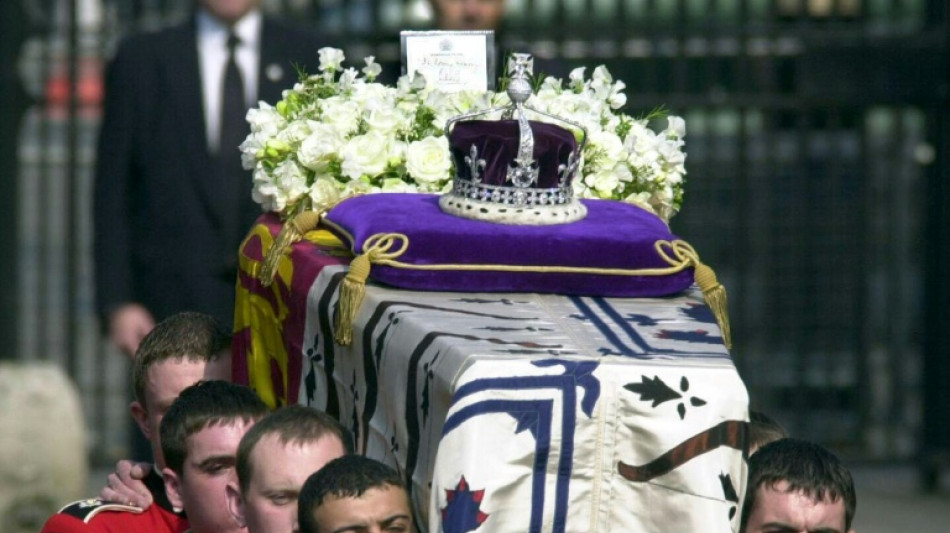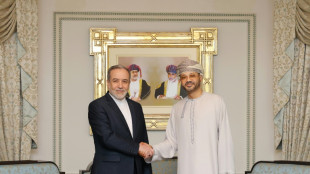
-
 German exports to US plunge as tariffs exact heavy cost
German exports to US plunge as tariffs exact heavy cost
-
Portugal heads for presidential vote, fretting over storms and far-right

-
 Suicide blast at Islamabad mosque kills at least 30, wounds over 130: police
Suicide blast at Islamabad mosque kills at least 30, wounds over 130: police
-
Russia says Kyiv behind Moscow shooting of army general

-
 Greenland villagers focus on 'normal life' amid stress of US threat
Greenland villagers focus on 'normal life' amid stress of US threat
-
Iran, US hold talks in Oman after Trump military threats

-
 Stocks waver as tech worries build
Stocks waver as tech worries build
-
Dupont, Jalibert click to give France extra spark in Six Nations bid

-
 'Excited' Scots out to prove they deserve T20 World Cup call-up
'Excited' Scots out to prove they deserve T20 World Cup call-up
-
EU tells TikTok to change 'addictive' design

-
 India captain admits 'there will be nerves' at home T20 World Cup
India captain admits 'there will be nerves' at home T20 World Cup
-
Stellantis takes massive hit for 'overestimation' of EV shift

-
 'Mona's Eyes': how an obscure French art historian swept the globe
'Mona's Eyes': how an obscure French art historian swept the globe
-
Iran, US hold talks in Oman

-
 Iran, US hold talks in Oman after deadly protest crackdown
Iran, US hold talks in Oman after deadly protest crackdown
-
In Finland's forests, soldiers re-learn how to lay anti-personnel mines

-
 Israeli president visits Australia after Bondi Beach attack
Israeli president visits Australia after Bondi Beach attack
-
In Dakar fishing village, surfing entices girls back to school

-
 Lakers rally to beat Sixers despite Doncic injury
Lakers rally to beat Sixers despite Doncic injury
-
Russian pensioners turn to soup kitchen as war economy stutters

-
 Japan taps Meta to help search for abuse of Olympic athletes
Japan taps Meta to help search for abuse of Olympic athletes
-
As Estonia schools phase out Russian, many families struggle

-
 Toyota names new CEO, hikes profit forecasts
Toyota names new CEO, hikes profit forecasts
-
Next in Putin's sights? Estonia town stuck between two worlds

-
 Family of US news anchor's missing mother renews plea to kidnappers
Family of US news anchor's missing mother renews plea to kidnappers
-
Spin woes, injury and poor form dog Australia for T20 World Cup

-
 Japan's Liberal Democratic Party: an election bulldozer
Japan's Liberal Democratic Party: an election bulldozer
-
Hazlewood out of T20 World Cup in fresh blow to Australia

-
 Japan scouring social media 24 hours a day for abuse of Olympic athletes
Japan scouring social media 24 hours a day for abuse of Olympic athletes
-
Bangladesh Islamist leader seeks power in post-uprising vote

-
 Rams' Stafford named NFL's Most Valuable Player
Rams' Stafford named NFL's Most Valuable Player
-
Japan to restart world's biggest nuclear plant

-
 Japan's Sanae Takaichi: Iron Lady 2.0 hopes for election boost
Japan's Sanae Takaichi: Iron Lady 2.0 hopes for election boost
-
Italy set for 2026 Winter Olympics opening ceremony

-
 Hong Kong to sentence media mogul Jimmy Lai on Monday
Hong Kong to sentence media mogul Jimmy Lai on Monday
-
Pressure on Townsend as Scots face Italy in Six Nations

-
 Taiwan's political standoff stalls $40 bn defence plan
Taiwan's political standoff stalls $40 bn defence plan
-
Inter eyeing chance to put pressure on title rivals Milan

-
 Arbeloa's Real Madrid seeking consistency over magic
Arbeloa's Real Madrid seeking consistency over magic
-
Dortmund dare to dream as Bayern's title march falters

-
 PSG brace for tough run as 'strange' Marseille come to town
PSG brace for tough run as 'strange' Marseille come to town
-
Japan PM wins Trump backing ahead of snap election

-
 AI tools fabricate Epstein images 'in seconds,' study says
AI tools fabricate Epstein images 'in seconds,' study says
-
Asian markets extend global retreat as tech worries build

-
 Sells like teen spirit? Cobain's 'Nevermind' guitar up for sale
Sells like teen spirit? Cobain's 'Nevermind' guitar up for sale
-
Thailand votes after three prime ministers in two years

-
 UK royal finances in spotlight after Andrew's downfall
UK royal finances in spotlight after Andrew's downfall
-
Diplomatic shift and elections see Armenia battle Russian disinformation

-
 Undercover probe finds Australian pubs short-pouring beer
Undercover probe finds Australian pubs short-pouring beer
-
Epstein fallout triggers resignations, probes


Crown jewel carries weight of UK's colonial past
The star of Britain's crown jewels, the Koh-i-Noor diamond, is back on view after a notable absence from Charles III's coronation that highlighted the nation's awkward ties with its colonial past.
The massive stone has appeared at formal occasions for over 150 years, but Charles's wife Camilla opted not to wear it for May's coronation amid debate in the UK over imperial artefacts and calls in India for the diamond's return.
Months after the coronation, with the crown jewels returned to public display in the Tower of London, the question remains: Where does the priceless gem rightfully belong?
Legend has it that the 186 carat diamond, which was cut down to 106 carats by Queen Victoria, has denoted supreme authority since at least the time of the Delhi Sultanate's invasion of the kingdoms of southern India in the 14th century.
The British state-chartered East India Company formally annexed the Kingdom of Punjab in 1849 after winning the Second Anglo-Sikh War, gaining the diamond as part of the resulting peace treaty and giving it to Queen Victoria.
Yet, New Delhi has repeatedly sought its return and foreign ministry spokesman Arindam Bagchi said last year: "We have been raising this matter from time to time with the UK government and we will continue to explore ways and means for obtaining a satisfactory resolution of the matter."
One man with a long connection to the diamond is Eddie LeVian, CEO of the US-based Le Vian fine jewellers -- which counts Rihanna and Jennifer Lopez as clients -- whose family looked after the diamond while it was in the hands of the Persian shah in the 18th century.
"I don't know what the legal argument would be to say that it should be returned to India, considering that it was gifted to Queen Victoria by the East India Company and was not taken from India by the British," LeVian told AFP at the Tower of London, which his company had taken over for an event.
"This diamond wasn't discovered by the Indian government," he added, saying that India didn't exist as a sovereign entity at the time of its discovery.
"I don't know if the claim went to an international court that the evidence would mean that the government of India has a right to the Koh-i-Noor diamond.
"As time passes, the question for India is becoming more frequently asked, but I don't see how India's claim could be resolved," he said.
- 'Unusable' -
Part of the problem for India is the diamond's uncertain history steeped in conquest.
While there is little doubt it was mined in India, its history thereafter is a mixture of myth and fact, with several countries including Afghanistan, Iran and Pakistan also laying claim to the gem.
Martin Bayly, assistant professor at the London School of Economics' Department of International Relations, told AFP that "the history is so contested that it would be impossible to agree upon any kind of legal ownership.
"And I don't know what authority would judge on that anyway."
The diamond came into British hands while India was made up of multiple different kingdoms and states rather than being a single country, and the family of the maharaja ruler who had prior possession argue that they are the rightful owners, not the Indian government.
"The arguments on legal ownership are coming from a contemporary legal context of sovereign nation states, reaching back in time to a period where legal nation state sovereignty meant something different," said Bayly.
Instead, India's best hope rests with the moral argument currently raging within the UK itself, he added.
"The public debate on this has become tied up in what's not very satisfactorily called the culture wars."
The diamond's display at the Tower of London now contains a label reading "a symbol of conquest", saying the peace treaty "compelled" the 10-year-old maharaja to "surrender" it.
Bayly also highlighted the recent return of various Benin Bronzes by different British institutions as an example of how the tide was generally turning.
"You can apply the same argument to the Koh-i-Noor diamond," he said.
"But I think probably the Koh-i-Noor diamond is in a separate class of politicised debate... because it's a symbol of rulership."
While the priceless gem has become "so diplomatically toxic" that it is "almost unusable" in state occasions, it would be "politically naive to believe" that any government would agree to its return, Bayly added.
"We're stuck," he added.
B.AbuZeid--SF-PST



